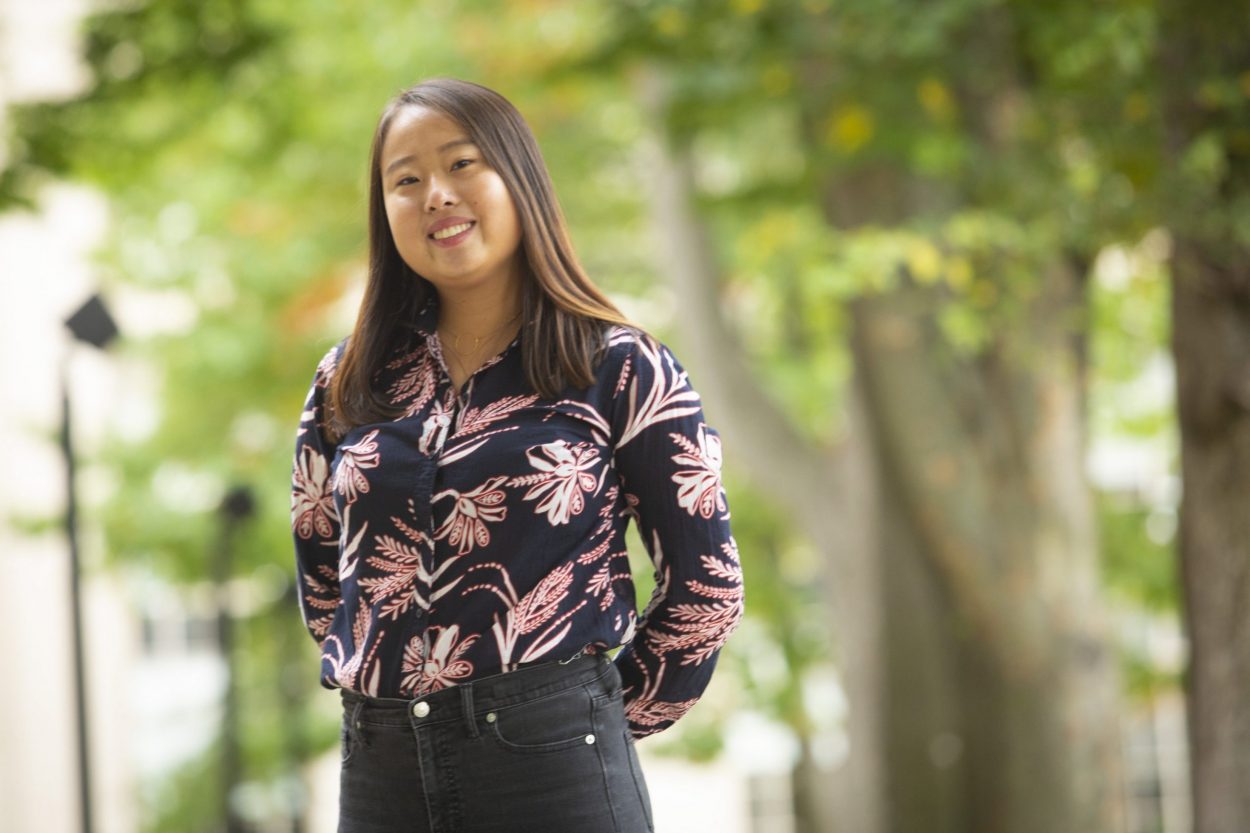Growing up in coastal Connecticut, Flora Klise’s childhood was shaped by water. She spent summers taking sailing lessons and working at a local marina. But it wasn’t until she stood next to a well in rural Tanzania that she realized she wanted to pursue a career in water innovation.
The summer before her junior year, Klise traveled to Tanzania alongside a team of MIT D-Lab students to work on the Okoa Project, an ambulance trailer that can be attached to motorcycles. While visiting one particular rural village, she noticed dozens of young children carrying large buckets and taking turns jumping up and down on a pump to get water from the well. At the kids’ urging, Klise started pumping water herself.
After five exhausting minutes pumping water, Klise rethought her career aspirations.
“It got me really thinking about water accessibility from an engineer’s perspective, and how the way people get water is so different in every part of the world,” says Klise, currently a senior studying mechanical engineering. “There’s a whole area of innovation in water accessibility — from filtering bacteria and viruses to figuring out how to get water to a house or rigging a device that makes pumping easier.”
Up until that point, Klise had focused on medical devices throughout her undergraduate experience at MIT. Concerned that it was too late to pivot from a career path in medical devices to one in water research, she sought the advice of her advisor, Warren Seering, the Weber-Shaughness Professor of Mechanical Engineering.
Seering encouraged Klise to follow her passion and not feel boxed in by her previous academic focus.
“Professor Seering asked, ‘Are you having fun exploring water research?’ and I said ‘Yes.’ To which he then said ‘See, you’re doing it right. You’re doing a great job,’” adds Klise. “Everyone needs an advisor who encourages them like that.”
In addition to a supportive advisor, Klise found freedom in the flexibility a mechanical engineering degree provides.
“Mechanical engineering is an area where you can get the technical skills you need to be able to do pretty much whatever you want,” she says. “You’re not limited by anything because it’s so broad, so it gives you the freedom to choose what you are actually passionate about, even later on in your undergraduate experience.”
With a renewed focus on water accessibility, Klise sought a UROP (Undergraduate Research Opportunities Program) project on water research. She quickly found an opportunity in the lab of John Lienhard, professor of mechanical engineering. Her project was to focus on desalinating brackish groundwater for agricultural use.
As a relative novice to water research, Klise had some catching up to do. Yvana Ahdab SM ’17, PhD ’21, a research assistant in the Lienhard lab, provided Klise with relevant literature to help her fill in the gaps.
“Working with Flora was seamless. She possesses the intellectual curiosity and drive central to the scientific research process, which often involves a series of setbacks before any success is realized,” says Ahdab.
Together, they worked on testing monovalent selective electrodialysis for the treatment of brackish groundwater. This process only filters harmful ions, keeping the ions that promote plant growth in the water. As a result, farmers save money by not needing to add as much fertilizer to their water, offering them a cost-effective, sustainable desalination alternative.
“The target application is to use this in agricultural irrigation systems. We’ve developed a cost model demonstrating the amount of money saved by not using as much fertilizer,” says Klise.
Last spring, before campus shut down due to the pandemic, Klise spent most of her time in the wet lab testing the flow rate of their system. After leaving campus due to lockdown, her focus shifted to a new project developing a techno-economic model for the pretreatment of groundwater. This project turned into Klise’s senior thesis.
Using a database of 28,000 brackish groundwater samples from the U.S. Geological Survey, Klise has been writing a MATLAB script to demonstrate how much money could be saved by pretreating groundwater with lime.
Klise has also pursued her passion for water research outside the lab. In the mechanical engineering and D-Lab class 2.729/EC.729 (Design for Scale), she worked on the FairCap project to develop a device that could filter a bucket of water, rather than individual glasses. Last fall, she worked as a student researcher for MIT Sea Grant, helping develop an autonomous aquaculture robot for oyster farming. As a member of MIT Water, Klise was active in planning Water Night 2021, held on April 22.
“Water Club is an amazing community at MIT of people passionate about water issues. Water Night is a real celebration of water that’s engaging for all ages,” she says.
After graduating in June, Klise will be joining one of the largest water innovation companies in the world, Xylem. Through Xylem’s two-year Engineering Leadership Development Program, Klise will rotate between three different positions across the company to get a sampling of different areas of water innovation she can pursue throughout her career.
“My main career motivation is the impact of water research and technology. Every year, the need for fresh accessible water is increasing, so there is really a need for innovation in that area,” says Klise.
While only a fraction of MIT students may end up pursuing careers in water innovation, according to Klise water is something that affects everyone on campus, whether they realize it or not.
“I think every student at MIT is connected to water and the ocean just from living in Cambridge or Boston. It’s inevitable that you are going to see things, smell things, and notice things related to water. I think that helps people rethink their relationship with water and how it impacts their own lives,” she adds.
